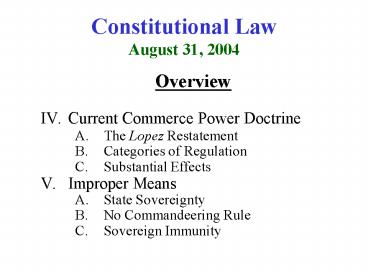Constitutional Law August 31, 2004 PowerPoint PPT Presentation
1 / 12
Title: Constitutional Law August 31, 2004
1
Constitutional LawAugust 31, 2004
- Overview
- Current Commerce Power Doctrine
- The Lopez Restatement
- Categories of Regulation
- Substantial Effects
- Improper Means
- State Sovereignty
- No Commandeering Rule
- Sovereign Immunity
2
Recap Current CC Doctrine
- Use of Channels
- Instrumentalities Of Persons/Things In
- Substantial Effects On
- Economic vs. Non Economic (Aggregate)
- Jurisdictional Requirement
- Findings Regarding Relevant Effects
- Traditional State Police Power Area
3
V. Improper MeansA. State Sovereignty
- Sovereignty Not Subject To Higher Power
- Dual Sovereignty
- Federal Law is Supreme
- But States Retain Sovereignty
- Protection of State Sovereignty
- Regulation of States (No-Commandeering)
- Remedies vs. States (Sovereign Immunity)
4
B. The No-Commandeering Rule1. Regulation of
States as States
- Forms of Regulation (link)
- FLSA Cases
- Wirtz permissible
- Usery (overruling Wirtz) impermissible
- Garcia (overruling Usery) permissible
- Key Points of Garcia
- Political Process Reasoning
- Possible Exceptions
- Dissents
5
2. Commandeering States
- Distinguish Garcia (link)
- New York v. United States
- Compelled Legislation
- No Commandeering Rule
- -- Historical Argument
- -- Political Process Argument
- 10th Am. as Mirror Image
If a power invades state sovereignty, then it is
necessarily a power the Constitution has not
conferred on Congress.
6
c. Printz v. United States
- The Brady Act Executive Officers
- Historical Practice
- Rationales from NY v.US
- Separation of Powers
7
3. Scope of N.C. Rule
- Branches of state government
- Legislature Applies (NY v. US)
- Executive Applies (Printz)
- Judiciary Does Not Apply (NY v. US)
- Compelled implementation, not
- General federal mandates (Garcia)
- Prohibition of action (Reno v. Condon)
- Other federal powers
- Conditional Spending OK (NY v. U.S)
- Reconstruction Amendments (?)
8
C. State Sovereign Immunity1. Background
- SI Generally (link)
- 11th Amendment
- Chisolm v. Georgia Response
- Suits by Citizens (Hans v. Louisiana)
- Suits vs. Officers (Ex parte Young)
- Abrogation
- 14th Amendment (Fitzpatrick)
- Commerce Power? (Seminole Tribe)
9
2. Alden and Its Progeny
- Federal vs. State Court
- 11th Amendment applies to federal courts
- Federal Suit in State Court?
- Alden
- Cant abrogate immunity in state court
- 11th Amendment Background
- SI as Constitutional Premise
- Article I powers Limited by Constitution
10
3. SI Exceptions
- Injunctive relief against officers
- Ex Parte Young
- No money damages or equivalent
- Waiver as a spending condition
- Must be clearly expressed
- Increasing importance
- Abrogate immunity under the 14th Am.
- Fitzpatrick v. Bitzer
- Must be clearly expressed
11
Form of Federal Regulation
Direct Regulation
States as States
Commandeering
Fed
Fed
Fed
People
States
People
States
People
Return
Return 2
12
State Sovereign Immunity Background
- Chisholm v. Georgia (1793) Diversity
Jurisdiction Includes Suits Against States. - 11th Amendment (1798) The Judicial Power of the
United States shall not be construed to extend to
any suit . . . Commenced or prosecuted against
one of the United States by Citizens of another
State . . . - Hans v. Louisiana (1890) 11th Amendment also
applies to suits against a state by its own
citizens arising under federal law. - Ex Parte Young (1908) Suits against state
officers for injunctive relieve are not barred by
the 11th Amendment. - Fitzpatrick v. Bitzer (1976) Congress may
abrogate immunity when acting pursuant to the
14th Amendment. - Pennsylvania v. Union Gas (1989) Congress may
abrogate immunity when acting pursuant to the
commerce power. - Seminole Tribe of Florida v. Florida (1996)
Congress may abrogate immunity when acting
pursuant to the commerce power (overruling Union
Gas).

